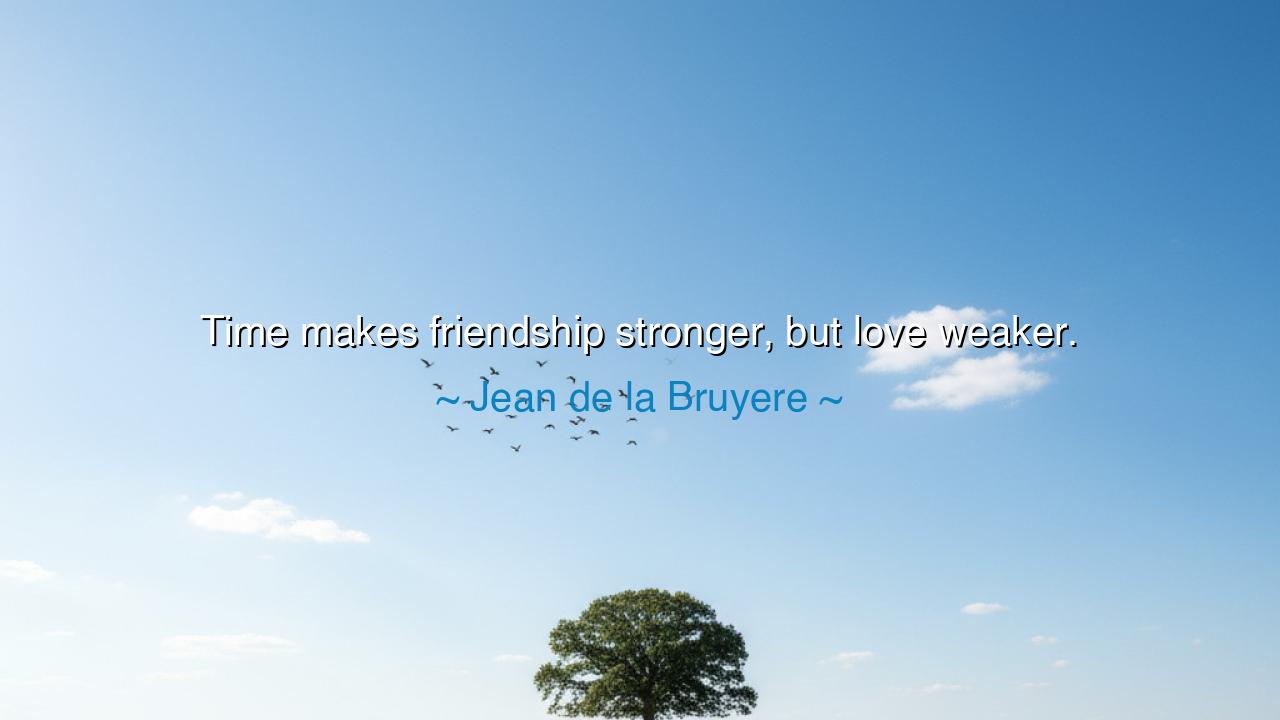
Time makes friendship stronger, but love weaker.






"Time makes friendship stronger, but love weaker." These words from Jean de la Bruyère capture a profound observation about the passage of time and its impact on the two most powerful human connections: friendship and love. In the tapestry of life, friendship and love are two threads that often intertwine, but they respond to the test of time in different ways. De la Bruyère suggests that as time wears on, friendship becomes more resilient, gaining depth and strength, while love—especially romantic love—tends to diminish or evolve into something less intense. This quote speaks to the evolving nature of human relationships, urging us to reflect on the transient nature of romantic passion versus the enduring quality of true friendship.
In the ancient world, the relationship between friendship and love was discussed extensively by philosophers. Aristotle, in his work Nicomachean Ethics, distinguished between different types of friendship. The highest form, which he called philia, was based on mutual respect and the desire for each other’s good. This kind of friendship grows deeper with time, as it is based not on fleeting emotions or pleasure, but on the shared pursuit of virtue. In contrast, love, particularly romantic love, often has a more volatile nature, driven by passion, which can fade or change as time passes. Aristotle acknowledged that love, especially in its romantic form, may fade or be replaced by other emotions as familiarity sets in. De la Bruyère’s reflection mirrors this ancient wisdom, acknowledging that the passage of time strengthens the bonds of friendship, while the initial fire of romantic love tends to lose its intensity.
Consider the example of David and Jonathan from the Bible—one of the most revered friendships in the ancient world. Their bond, which was forged in moments of shared loyalty and self-sacrifice, only deepened over time. They were separated by circumstance, yet their connection remained unwavering, with each offering support and strength to the other. This is the kind of friendship that, as de la Bruyère notes, grows stronger with time. David and Jonathan’s friendship did not rely on passion or fleeting emotions, but on a shared commitment and mutual respect. Even in times of adversity, their friendship endured, demonstrating the enduring strength that true friendships develop as time passes.
In contrast, consider the relationship between Cleopatra and Julius Caesar, and later Cleopatra and Mark Antony. While their loves were intense and deeply passionate, both relationships were subject to the vicissitudes of time and power. As political and personal challenges mounted, both of these romantic relationships gradually weakened, either by the demands of leadership or by political intrigue. The intensity of their early loves faded as the pressures of time and circumstance took their toll. These examples illustrate de la Bruyère’s point that romantic love, while powerful in its early stages, is often less able to withstand the long, quiet passage of time in the way that friendship can.
The lesson from de la Bruyère is not to diminish the value of love, but to recognize that friendship has the ability to endure and grow stronger as time progresses. Love, in its romantic form, may be consumed by the practicalities of life or the fading of passion, but friendship, founded on respect, shared values, and mutual care, continues to thrive. The ancient Greeks understood this well, with Plato writing about how friendship grounded in virtue could outlast the more fleeting aspects of human emotion. As time passes, friendship evolves from a simple connection into a deep, meaningful bond that becomes a cornerstone in one's life. In contrast, romantic love is often less certain, changing or fading with the years, but not always reaching the enduring strength of true friendship.
De la Bruyère’s words urge us to cherish and nurture the friendships we have, recognizing that these connections will likely grow in depth and richness over time. Love, particularly in its romantic form, may not remain as strong, but friendship can remain a constant source of support, joy, and wisdom. We must focus on creating friendships that are not merely based on convenience or temporary pleasure, but on shared values, mutual respect, and a commitment to each other’s growth. In doing so, we build relationships that can stand the test of time and provide us with a steady anchor when the storms of life arise.
In our own lives, let us reflect on the relationships that endure and the ones that fade with time. Do we cultivate friendships that grow stronger as we age, based on respect and shared experiences? Are we able to look beyond the initial passions of romantic love and recognize when a relationship might need to evolve into something deeper and more enduring? By acknowledging the changing nature of love and the steady growth of friendship, we can navigate our relationships with greater wisdom, nurturing those bonds that will bring lasting fulfillment as we move through the seasons of life.






AAdministratorAdministrator
Welcome, honored guests. Please leave a comment, we will respond soon